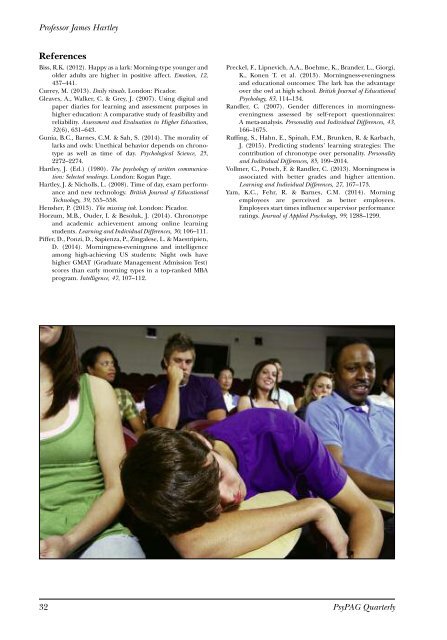Social Psychology Special Issue
PsyPAG-Quarterly-Issue-973
PsyPAG-Quarterly-Issue-973
You also want an ePaper? Increase the reach of your titles
YUMPU automatically turns print PDFs into web optimized ePapers that Google loves.
Professor James Hartley<br />
References<br />
Biss, R.K. (2012). Happy as a lark: Morning-type younger and<br />
older adults are higher in positive affect. Emotion, 12,<br />
437–441.<br />
Currey, M. (2013). Daily rituals. London: Picador.<br />
Gleaves, A., Walker, C. & Grey, J. (2007). Using digital and<br />
paper diaries for learning and assessment purposes in<br />
higher education: A comparative study of feasibility and<br />
reliability. Assessment and Evaluation in Higher Education,<br />
32(6), 631–643.<br />
Gunia, B.C., Barnes, C.M. & Sah, S. (2014). The morality of<br />
larks and owls: Unethical behavior depends on chronotype<br />
as well as time of day. Psychological Science, 25,<br />
2272–2274.<br />
Hartley, J. (Ed.) (1980). The psychology of written communication:<br />
Selected readings. London: Kogan Page.<br />
Hartley, J. & Nicholls, L. (2008). Time of day, exam performance<br />
and new technology. British Journal of Educational<br />
Technology, 39, 555–558.<br />
Hensher, P. (2013). The missing ink. London: Picador.<br />
Horzum, M.B., Ouder, I. & Besoluk, J. (2014). Chronotype<br />
and academic achievement among online learning<br />
students. Learning and Individual Differences, 30, 106–111.<br />
Piffer, D., Ponzi, D., Sapienza, P., Zingalese, L. & Maestripien,<br />
D. (2014). Morningness-eveningness and intelligence<br />
among high-achieving US students: Night owls have<br />
higher GMAT (Graduate Management Admission Test)<br />
scores than early morning types in a top-ranked MBA<br />
program. Intelligence, 47, 107–112.<br />
Preckel, F., Lipnevich, A.A., Boehme, K., Brander, L., Giorgi,<br />
K., Konen T. et al. (2013). Morningness-eveningness<br />
and educational outcomes: The lark has the advantage<br />
over the owl at high school. British Journal of Educational<br />
<strong>Psychology</strong>, 83, 114–134.<br />
Randler, C. (2007). Gender differences in morningnesseveningness<br />
assessed by self-report questionnaires:<br />
A meta-analysis. Personality and Individual Differences, 43,<br />
166–1675.<br />
Ruffing, S., Hahn, E., Spinah, F.M., Brunken, R. & Karbach,<br />
J. (2015). Predicting students’ learning strategies: The<br />
contribution of chronotype over personality. Personality<br />
and Individual Differences, 85, 199–2014.<br />
Vollmer, C., Potsch, F. & Randler, C. (2013). Morningness is<br />
associated with better grades and higher attention.<br />
Learning and Individual Differences, 27, 167–173.<br />
Yam, K.C., Fehr, R. & Barnes, C.M. (2014). Morning<br />
employees are perceived as better employees.<br />
Employees start times influence supervisor performance<br />
ratings. Journal of Applied <strong>Psychology</strong>, 99, 1288–1299.<br />
32 PsyPAG Quarterly


